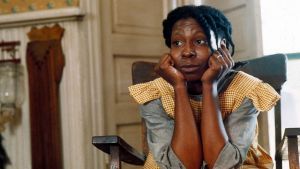The Color Purple (1985)
The Color Purple was released on December 16, 1985, in the USA. The film was produced by Amblin Entertainment, The Guber-Peters Company, and Warner Bros. Steven Spielberg was the director of the film. The film is displaying how Celie as a black woman is discriminated against from 1909 to 1947, which was based on The Color Purple novel[1].
Plot

At a very young age, Celie (Whoopi Goldberg) is raped by her father. Her children are taken away when they are born. As she faces struggle throughout her life, she usually confides her feelings to her sister, Nettie (Akosua Busia). Later on, Celie has a forced marriage with Albert (Danny Glover), a black widower. Nettie defies her father in many things that would lead her to the kicking from the house. As Celie feels alone, she meets the other two friends Sofia (Opray Winfrey), the wife of Harpo (Willard E. Pugh), Albert's son. Celie is amazed by Sofia's confidence since she fights for her rights bravely all her life. When Celie gets sick, Albert calls Shug (Margaret Avery) to the house. Shug gives Celie to love and pleasure, which Celie never has throughout her life. One time, Celie discovers that Nettie is still alive and has sent a letter to her. Eventually, Celie finds that Celie always sends a letter to her but Albert holds the letter. This has enraged Celie and Celie decides to leave Albert. She opens her clothing store and at last, she goes to Africa and meets her children and her sister[3].
Black Empowerment
The film reveals how Sofia is determined to stand up for her rights and independence. When she encounters Miss Millie, a white racist employer, she answers "hell no!" when Miss Millie asks her to be her maid. While Miss Millies's husband hit Sofia, Sofia hits back even though there would come consequences for her action[4]. She defies the mayor's order and causes a fight that led her to be blinded and years in jail. Yet, she recovers her dignity and boldness and finally attains her freedom to escape to Africa, to meet her children and her sister[5]. Celie might spend her life being considered shameful and dishonorable still, she embraces her flaws and imperfections and would not let anybody's words discourage her as she says "I'm poor, black, I may even be ugly, but dear god, I'm here! I'm here!"[6].
Controversy
At the time, it is shown that black skin is considered ugly. Even Celie thinks of herself as ugly due to her very dark skin. Not only white folks, but even the black people also call her ugly. Moreover, the film indicates that there are limited job opportunities as black men tend to be working only on the farm while the black woman is either going to be a mother or maid to earn money for a living. Like Miss Millie tells Celie to be working as her maid[7].
References
- ↑ The Color Purple (1985). IMDb. Retrieved January 30 2021
- ↑ The Color Purple Moviestore Limited. Retrieved January 30 2021
- ↑ Frederic and Mary Ann Brussat. The Color Purple Spirituality and Practice. Retrieved January 30 2021
- ↑ Florian Metral. The Color Purple » – Doudou Aichatou Hypotheses. Retrieved January 30 2021
- ↑ Roger Ebert. The Color Purple RogerEbert. Retrieved January 30 2021
- ↑ Melissa Kimble. In Honor of Its 33rd Anniversary, Here Are 10 Life Lessons I Learned From the Color Purple OprahMag. Retrieved January 30 2021
- ↑ The Color Purple LitChart. Retrieved January 30 2021